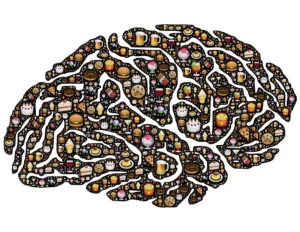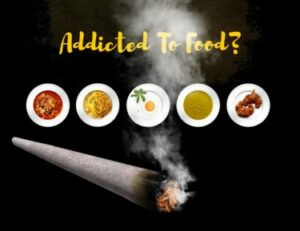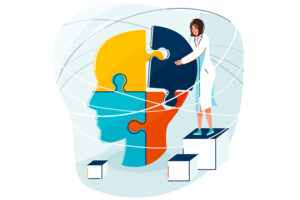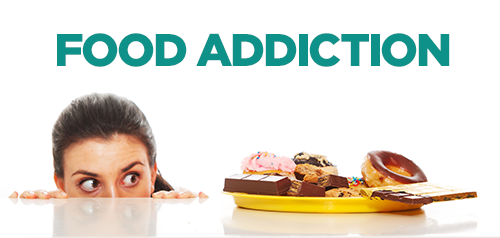Do you feel like you are constantly at war with food? Are you struggling to control your cravings and keep your eating under control? If so, you are not alone. Food addiction is a very real problem that many people struggle with every day. In this blog post, we will discuss the causes of food addiction and offer some tips for conquering your cravings and repairing your relationship with food.
Contents
Defining Food Addiction
 Food is a natural and necessary part of life. We need food to survive and thrive. However, for some people, food can become a dangerous addiction. Just like with any other addiction, people who are addicted to food compulsively seek out and consume large amounts of food even when they are not hungry.
Food is a natural and necessary part of life. We need food to survive and thrive. However, for some people, food can become a dangerous addiction. Just like with any other addiction, people who are addicted to food compulsively seek out and consume large amounts of food even when they are not hungry.
Food addiction might be seen as barely a matter of willpower by some people. However, it is much more complicated than that. Food addiction is a real, clinically recognized disorder. In fact, food addiction has been found to share many similarities with other types of addiction, such as drug and alcohol addiction.
It is a serious case of disordered eating which can be detrimental to your physical and mental health. So, if you think that you might be struggling with food addiction, it is important to seek help.
Signs That You Need Help For Food Addiction
 It can be very tricky to figure out if you have a problem with food addiction. This is because, for many people, eating is such a natural and normal part of life. However, there are some warning signs that you can look out for which might indicate that you need help with your relationship to food.
It can be very tricky to figure out if you have a problem with food addiction. This is because, for many people, eating is such a natural and normal part of life. However, there are some warning signs that you can look out for which might indicate that you need help with your relationship to food.
Some of the signs that you might be struggling with food addiction include:
- Eating more food than you intended to or feeling like you can’t control how much you are eating
- Feeling guilty or ashamed after eating
- Frequently thinking about food or planning your next meal even when you are not hungry
- Eating to the point of discomfort or feeling sick
- Avoiding social situations or events because you are afraid of what or how you will eat
- Experiencing withdrawal symptoms when you try to cut back on certain foods
If you are struggling with any of these signs, it is important to seek help. Food addiction can be a very difficult thing to overcome on your own.
Techniques Used In Food Addiction Help
Fortunately, there are a number of different techniques that can be used in order to help you overcome your food addiction. These may range from medical, physiological, and psychological approaches. Some of the techniques that may be used in food addiction help include:
Psychiatric intervention
Any type of addiction is a serious matter that requires professional help. A psychiatrist can help to identify any underlying mental health conditions that may be contributing to your disordered eating. They can also offer medication and other treatments which can help you to overcome your food addiction.
Psychiatric intervention usually happens in a hospital environment. This provides a safe place for you to detox from your addiction and start your journey to recovery. There is also a presence of medical staff who can offer support and assistance if needed. The main objective of this approach in this environment is to help you develop healthy eating habits and to gain a better understanding of your relationship with food. Some of the techniques that may be used in medical intervention include:

- Medical detoxification: This is a process whereby the person gradually stops consuming the addictive substance. This is usually done under medical supervision in order to ensure that the person is safe and comfortable.
- Nutritional support: This involves providing the person with the nutrients that they need in order to restore their health. This is usually done through a combination of dietary changes and supplements.
- Hydration therapy: This is a process whereby the person is rehydrated through IV fluids. This is often necessary when someone is suffering from severe malnutrition.
- Therapeutic interventions: These are usually psychological or psychiatric therapies that can help the person to understand and overcome their addiction. We will read more about this in the coming sections.
- Maintenance: This is a process whereby the person continues to receive support after they have completed their treatment. This may involve attending group meetings or therapy sessions.
- Relapse prevention: This is a process whereby the person is taught how to identify and avoid triggers that may cause them to relapse.
These are just some of the techniques that may be used in food addiction help. It is important to remember that everyone is different and will require a customized treatment plan.
Nutritional counseling
 One of the most important aspects of overcoming an addiction is to develop a healthy relationship with food. This means learning about nutrition and how to make good choices when it comes to what you eat. A dietitian can help you to understand more about nutrition and how to make healthier choices. They can also offer advice on how to eat in a way that is more balanced and nourishing. Some of the techniques under this approach of treatment include:
One of the most important aspects of overcoming an addiction is to develop a healthy relationship with food. This means learning about nutrition and how to make good choices when it comes to what you eat. A dietitian can help you to understand more about nutrition and how to make healthier choices. They can also offer advice on how to eat in a way that is more balanced and nourishing. Some of the techniques under this approach of treatment include:
- Eating a healthy diet: This means eating a balanced diet that includes all the major food groups. It is also important to eat regular meals and to avoid skipping meals.
- Monitoring your portion sizes: This means being aware of how much you are eating and making sure that you are not overeating.
- Making healthy choices when eating out: This means choosing restaurants that offer healthy options and avoiding processed foods.
- Pre-planning your meals: This means planning ahead and preparing your meals in advance. This can help to prevent you from making unhealthy choices when you are feeling hungry.
- Avoiding trigger foods: This means avoiding the foods that you are most addicted to.
- Keeping a food journal: This means writing down everything that you eat in order to track your progress.
- Exercise: Exercise is an important part of any weight loss or addiction recovery program. It can help to burn calories, boost your mood, and improve your overall health. It is important to find an exercise routine that you enjoy and that you can stick to.
Because food and nutrition play such a big role in food addiction, it is important to seek help from a professional who is qualified to offer this type of support.
Psychological therapy
 Because eating disorders are also often psychological disorders, it is important to seek help from a therapist. A therapist can help you to understand your thoughts and feelings about food. They can also help you to develop healthy coping mechanisms. Some of the techniques that may be used in therapy include:
Because eating disorders are also often psychological disorders, it is important to seek help from a therapist. A therapist can help you to understand your thoughts and feelings about food. They can also help you to develop healthy coping mechanisms. Some of the techniques that may be used in therapy include:
- Cognitive behavioral therapy: This is a type of therapy that helps you to change your thinking patterns.
- Interpersonal therapy: This is a type of therapy that helps you to improve your relationships with others.
- Dialectical behavioral therapy: This is a type of therapy that helps you to deal with strong emotions.
- Psychodynamic therapy: This is a type of therapy that helps you to understand your past and how it affects your present.
- Family therapy: This is a type of therapy that helps you to improve your relationship with your family.
- Support groups: These are groups of people who share similar experiences. They can offer support and advice.
It is important to remember that everyone is different and will require a customized treatment plan.
Self-care
 Lastly, self-care can be the key to maintaining your recovery. This means taking care of yourself emotionally and physically. When struggling with food addiction, the most helpful tips can be as follows.
Lastly, self-care can be the key to maintaining your recovery. This means taking care of yourself emotionally and physically. When struggling with food addiction, the most helpful tips can be as follows.
- Identify your triggers: This means being aware of the things that trigger your cravings or make you want to binge eat.
- Plan ahead: This means having healthy snacks on hand and knowing what you will eat ahead of time.
- Find other outlets: This means finding other things to do when you are feeling bored or stressed. This can include exercise, reading, or spending time with friends and family.
- Talk to someone: This means talking to a friend, therapist, or support group about your struggles. This can help you to feel supported and not alone.
- Avoid dieting: This means avoiding restrictive diets that can trigger binging or overeating.
- Eat mindfully: This means paying attention to your food and savoring each bite.
- Exercise regularly: This means finding an exercise routine that you enjoy and that helps to relieve stress.
- Practice self-love: This means being kind to yourself and accepting yourself for who you are. It may seem difficult at first, but it is important to remember that you are worth the effort.
- Get enough sleep: This means getting seven to eight hours of sleep each night.
- Manage stress: This means finding healthy ways to cope with stress such as yoga, meditation, or journaling.
When it comes to food addiction help, the most important thing you can do is work on conquering your cravings. This may seem like a daunting task, but it is possible to overcome your cravings with the help of a few simple strategies.
Things To Consider
If you are considering getting help for food addiction, there are some things you might want to keep in mind.
- First and foremost, it is important to find a treatment program that is right for you. Not every treatment program will work for every person. It is important to do your research and find a program that has been successful for people with similar issues as you.
- You should also weigh the severity of your symptoms. This means that you should consider how much your food addiction is impacting your life. If you feel like it is taking over your life and causing serious problems, it is probably time to seek professional help.
- You should also consider the cost of treatment. Some programs can be very expensive. However, there are also many affordable options available. You may also contact your insurance company for details about cost management.
- It is also important to be patient with yourself. The journey of overcoming food addiction is not going to be an easy one. There will likely be setbacks and relapses along the way. However, it is important to remember that every step forward is a step in the right direction.
If you are struggling with food addiction, know that you are not alone. Many people have been in your shoes and have overcome their addictions. With the right help, you can too.
Conclusion
Food addiction is a serious problem that can have a negative impact on your physical and mental health. If you think that you may be struggling with food addiction, it is important to seek help from a qualified professional. With the right treatment plan, you can overcome your cravings and develop a healthy relationship with food. Treating an addiction can be a difficult and daunting task, but it is important to remember that recovery is possible.
If you or someone you know is looking for psychological help, Therapy Mantra is here for you. We are the leading providers of online therapy and counseling. Our team of highly trained and experienced therapists can provide assistance at the most affordable rates. We also have a team of nutritionists providing nutritional counseling to manage food-related problems. Contact us today to learn more about our services. You may also visit our website to book an online therapy session or download our free Android or iOS app for more information.


